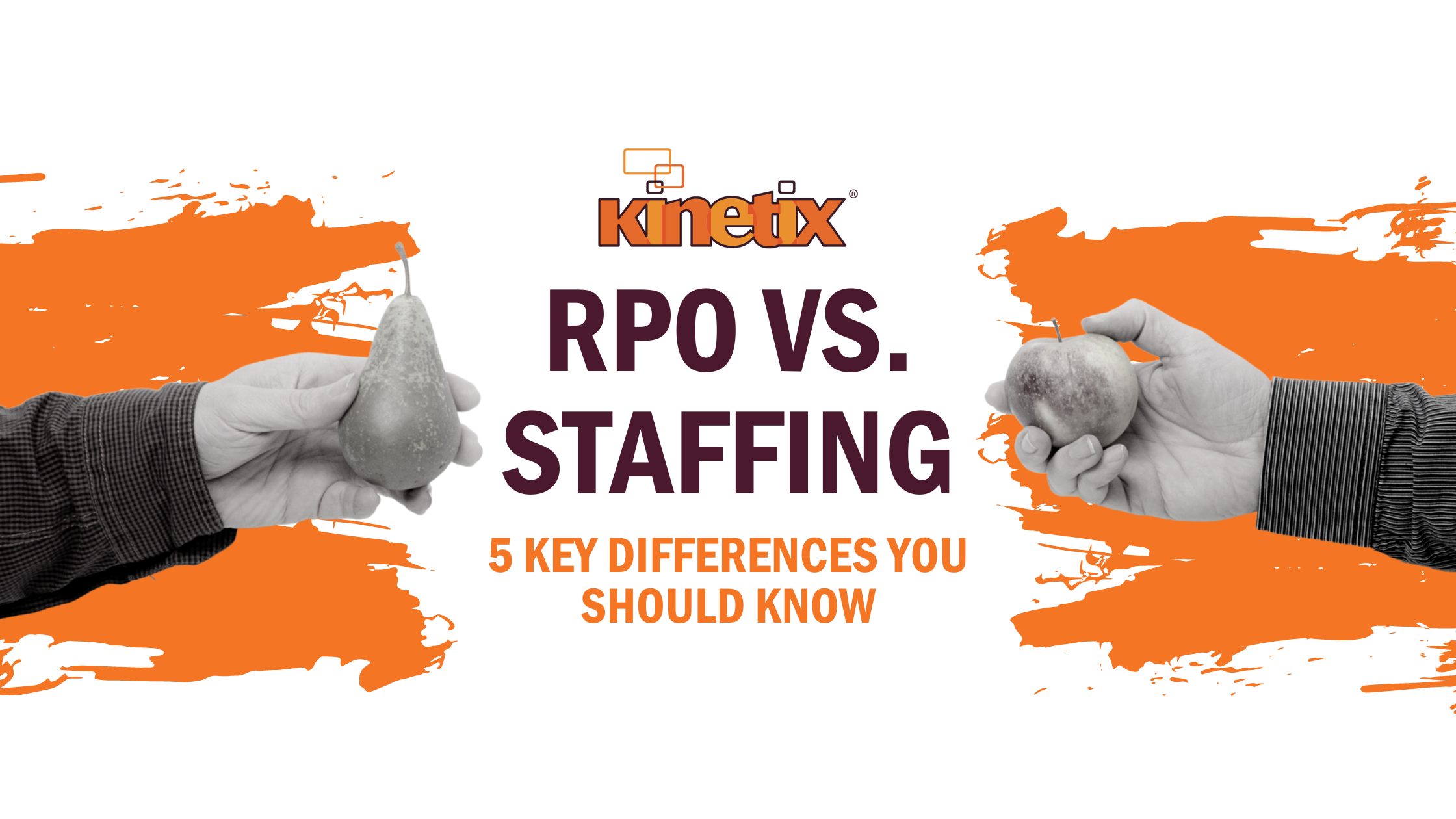
External recruitment experts generally fall into two categories: staffing agencies and recruitment process outsourcing (RPO) firms.
There are similar offerings between staffing and RPO companies, such as access to a scalable workforce, cost-effective hiring, and a broad talent pool, making both external recruiter types highly advantageous.
Yet, it is critical to acknowledge the key differences in RPO vs. staffing.
Your company needs to assess several factors, such as the type of job openings and the goals of a partnership when considering RPO vs. recruitment agencies.
Basic Definitions of Recruitment Process Outsourcing & Traditional Staffing

What is RPO?
RPO (Recruitment Process Outsourcing) is the delegation of the recruitment process to an external organization. It’s not just about finding the right people but spans the entire hiring procedure, from defining roles to onboarding candidates.
This approach often integrates into the company's culture, aligning recruitment strategies with the company’s vision and values. RPOs offer a more strategic, holistic solution to talent acquisition by encompassing various facets of the recruitment cycle.
What is Traditional Staffing?
Staffing is a more traditional model where agencies source, screen, and place candidates in specified roles. These agencies maintain a pool of candidates, matching them quickly with company needs based on skillset and experience.
Unlike RPO, staffing solutions typically focus on immediate, often temporary, hiring needs without integrating deeply into the hiring company’s processes or culture.
The Differences Between RPO and Staffing

Generally, you can consider staffing agencies as the “middlemen” in the recruitment process as they identify suitable candidates for a job opening and submit vetted CVs to your company accordingly. Staffing agencies recommend potential hires to your company through a guided talent acquisition process for the short term.
On the other hand, your company can work with an RPO provider that offers greater engagement for refining your hiring strategies while taking a proactive approach to finding the best job fit for your organization across candidate funnels.
#1 - Scope of Service
By understanding the full breadth of services under each approach, businesses can better determine which method aligns with their immediate and future hiring needs.
RPO
- Comprehensive Solution: Unlike traditional recruitment methods, the RPO staffing model is about more than filling positions - it acts as an extension of talent acquisition teams. It covers a wide gamut of services that begin even before the actual recruitment starts. This includes workforce planning, creating a comprehensive job profile, and developing a strategy for candidate outreach.
- Candidate Experience Management: The RPO provider often looks into curating an optimal candidate experience. From ensuring a responsive application process to transparent communication and feedback loops, RPO providers prioritize maintaining the company's image and candidate satisfaction.
- Employer Branding: Many RPOs also play a pivotal role in employer branding. They strategize and position the company as a desirable place to work, enhancing the attraction of top-tier talent.
- Analytics and Reporting: RPO providers are also vested in offering insights through analytics, ensuring companies can make informed decisions. This could be in the form of time-to-hire metrics, sources of best candidates, and even retention rates.
Staffing
- Immediate Placement Focus: Staffing agencies operate with a primary objective of filling open positions promptly. They maintain an extensive database of candidates and match them to roles based on the immediate requirements of the company.
- Contractual Engagements: Staffing agencies often specialize in providing contractual or temporary staff for projects or seasonal requirements. These roles might not necessarily be long-term but address an immediate business need.
- Skill-Specific Recruitment: Many staffing agencies specialize in specific sectors or skill sets, ensuring a faster turnaround in those areas. Whether it's IT, healthcare, or finance, they have a roster of pre-screened candidates ready for deployment.
- Onboarding and Administration: Beyond just recruitment, some staffing agencies also manage the initial onboarding processes, handling paperwork and initial training, ensuring the candidates are job-ready from day one.
#2 — Engagement Duration

RPO
- Long-Term Collaboration: RPO partnerships are often seen as an extension of the client company. This results in a deep-seated collaboration that goes beyond short-term goals, focusing on sustainable and continuous recruitment solutions for the future.
- Adaptability to Evolving Needs: RPOs can adapt to these shifts as companies grow or change direction, ensuring the recruitment strategy remains aligned with the company's evolving objectives.
Staffing
- Short-Term Focus: Staffing agencies typically work on immediate needs. Once they fulfill a particular requirement, the engagement concludes until the next need arises.
- Rapid Engagement and Conclusion: These agencies are structured for quick engagements, efficiently addressing sudden vacancies or project-based requirements.
#3 — Flexibility & Scalability
RPO
- Adaptable Frameworks: RPO providers offer solutions that can scale up during boom periods and scale down during slower business phases, ensuring optimal resource allocation throughout.
- Custom Solutions: They design recruitment processes tailored to the specific needs, culture, and values of the client company.
Staffing
- Immediate Response: Staffing agencies shine in situations where rapid scalability is required, such as a sudden project that needs immediate manpower.
- Fixed Processes: They typically have established processes that are applied across various clients, prioritizing speed over customization.
#4 — Cost Structure

RPO
- Value-Driven Pricing: With RPOs, the pricing models often revolve around the overall value delivered, such as a holistic recruitment solution. This could be milestone-based or tied to specific deliverables.
- Economies of Scale: In long-term partnerships, as RPOs manage more of the recruitment, cost-per-hire tends to decrease, providing savings in the long run.
Staffing
- Position-Based Pricing: Costs are usually tied to each placement or contract duration, making it easy to anticipate expenses for short-term needs.
- Transparent Margins: Staffing agencies often have clear margins added to hourly rates or a clear percentage for permanent placements.
#5 — Ownership and Branding
RPO
- Unified Brand Experience: RPOs ensure that the entire recruitment process, from job advertisements to interviews, remains under the client company's branding. This consistency strengthens the employer brand in the eyes of potential candidates.
- Feedback Integration: RPO providers often collect feedback to continually refine the process under the brand’s umbrella, ensuring alignment with the company's values and culture.
Staffing
- Agency-Centric Branding: Often, interactions are under the staffing agency’s brand, especially in initial communications, which might not provide a consistent brand experience for candidates.
- Limited Brand Evolution: Feedback and refinements are typically more transaction-focused, with less emphasis on evolving the client's employer branding.
#6 — Recruiting Technology and Infrastructure

RPO
- Innovative Integration: RPO providers often incorporate the latest tech solutions, from advanced Applicant Tracking Systems (ATS) to AI-driven candidate matching, ensuring a seamless and efficient recruitment process.
- Continuous Upgradation: They invest in keeping their tech stack updated, ensuring they stay ahead in sourcing techniques, analytics, and candidate experience enhancements.
Staffing
- Functional Tech Use: While staffing agencies use technology, it's often more generic and centered on rapidly matching candidates to roles.
#7 — Strategic vs. Tactical Approach
RPO
- Strategic Alignment: RPOs dive deep into understanding the company’s long-term vision, ensuring talent acquisition strategies align with where the company is headed.
- Continuous Improvement: With a finger on the pulse of global recruitment trends, RPOs offer insights and suggestions to refine hiring strategies over time.
Staffing
- Tactical Efficiency: Staffing agencies are laser-focused on immediate results, ensuring quick wins and rapid position fills.
- Reactive Approach: They respond to the immediate needs of the market and the client, which is invaluable for urgent requirements but might lack long-term strategic evolution.
RPO vs Staffing Agency: Pros & Cons

The Pros of Recruitment Process Outsourcing
- Holistic Talent Strategy: RPO providers offer an all-encompassing approach to recruitment, ensuring that the entire process, from job profiling to onboarding, aligns with a company's vision and culture.
- Cost-Savings at Scale: While there might be an initial investment, the long-term relationship with RPOs often results in reduced cost-per-hire, especially when recruiting at scale.
- Adaptive Technology Integration: Embracing the latest in HR tech, RPOs use cutting-edge tools tailored for the client's needs, ensuring a competitive edge in the talent market.
- Strengthened Employer Brand: By consistently managing the recruitment process under the company's banner, RPOs enhance and fortify the employer brand, making it more attractive to top talent.
Potential Cons of RPO
- Initial Transition Phase: Switching to an RPO model may require an adjustment period as they integrate and understand the nuances of the company.
- Longer Engagement Requirement: RPOs work best in long-term partnerships, which might seem like a commitment for companies used to short-term engagements.
The Pros of Traditional Staffing
- Quick Turnaround: Staffing agencies can be valuable when there’s a pressing need, offering immediate placements to address sudden vacancies or short-term projects.
- Simplified Process: For companies not seeking comprehensive solutions, staffing agencies provide a straightforward route to fill specific positions.
The Downside of Staffing
- Inconsistent Employer Branding: Engaging with multiple staffing agencies can lead to a fragmented candidate experience and dilution of the company’s employer brand.
- Potentially Higher Costs: On a per-hire basis, especially for long-term roles, staffing can turn out to be more expensive due to marked-up rates or premiums.
- Less Strategic Integration: While they offer quick solutions, staffing agencies might not always align with a company's long-term vision or provide insights into evolving recruitment trends.
- Limited Scalability: While efficient for immediate needs, staffing agencies might not be as effective when a company undergoes rapid growth or requires a large volume of hires.
How to Choose Between RPO and Staffing for Your Business
When your business needs new people, deciding how to find them is a big step. You might be looking at Recruitment Process Outsourcing (RPO) or using a staffing agency. Here's a simple guide to help you decide which one fits your needs better.
Understanding What You Need
Start by thinking about how many people you need to hire and how often. If you need a lot of people all the time, working with RPO staffing companies might be the way to go because they handle everything from start to finish. But if you only need a few people now and then, a staffing agency can quickly find you the right person for the job. Also, think about the jobs you're hiring for. Are they long-term roles that are key to your business, or short-term for specific projects? RPO is good for the long-term, strategic hires, while staffing agencies are great for short-term needs.
Look at Your Business
Consider where your business is at right now. If you're growing and think you'll need more and more people, RPO can grow with you. But if your hiring needs are steady and not changing much, a staffing agency might be easier.
Check Your Own Team
How's your own hiring team doing? If they're swamped and could use some help, RPO can work alongside them, taking care of everything from finding candidates to hiring them. If your team just needs a little extra help now and then, staffing agencies can fill in the gaps.
Money Matters
Think about your budget. RPO can be a bit of an investment at first but can save you money in the long run, especially if you're hiring a lot. Staffing agencies might have lower upfront costs, which is great if you're watching your spending closely.
Keeping Your Brand in Mind
Your company's image is important, even when you're hiring. RPO makes sure the hiring process looks and feels like your company, which can attract better candidates. Staffing agencies might not focus as much on your brand, which is something to keep in mind.
Picking a Partner
When you're ready to choose, look for a partner with experience in your industry and ask them how they'd fit with your company. It's important they understand what you need and can adapt to your way of doing things.
Making It Work
If you go with RPO, think about how they'll work with your team and fit into your company. If staffing is your choice, make sure there's a clear plan for how they'll communicate with you and get new hires started.
By thinking about what your business needs, where it's going, and how much you can spend, you can find the right fit. Whether it's RPO for a long-term partnership or a staffing agency for quick hires, the right choice will help your business grow.
Closing Thoughts — RPO Vs. Recruitment Agency
-1.png?width=1080&height=1080&name=Sept%20Social%20Posts%20(Square)-1.png)
While a staffing agency can help match your company with the most suitable candidates based on your organizational needs, an RPO collaboration is a long-term partnership that optimizes your core talent acquisition process.
When it comes to RPO vs. staffing agency, you can trust the former to provide your company with dedicated support in outsourcing your most complex recruitment operations.
Kinetix is a leading RPO partner that empowers your company with advanced tools and technologies that enhance your existing recruitment practices. We offer multiple RPO services, including project RPOs for increasing the diversity of your workforce, among other specialized recruitment strategies.
Our team has successfully assisted client companies through the most challenging recruitment scenarios, expediting the hiring process with real results through carefully coordinated strategies.
Reach out to the Kinetix team to discover how we can help you exceed your recruitment goals with a customized plan based on your organizational goals and priorities.

